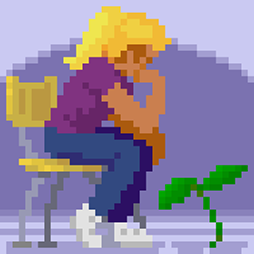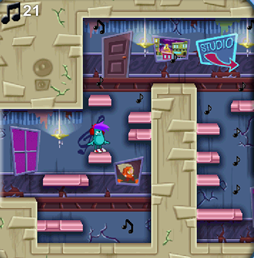PLAYING TO LEARN: Using Games to Help Teach Difficult Concepts
The Possible Worlds digital games are designed to help improve student understanding of phenomena that are often the subject of scientific misconceptions. Developed by EDC|Center for Children and Technology (EDC|CCT) over the course of two research and development projects, the games are the centerpieces of modules that address four topics: photosynthesis, heredity, electricity, and heat transfer. Each module includes accompanying classroom activities that leverage students’ experiences within the games.
Our game modules are designed to help students build novel conceptual models, and provide tools to help teachers and students draw analogies between the games and science concepts. Students also have fun because our games use popular game genres and engaging storylines. To learn more about the original Possible Worlds project watch this video. For a video on the analogy mapping research read on or watch this NSF Showcase video.
Build novel conceptual models
 Scientific phenomena can be
Scientific phenomena can be
counterintuitive and hard for
us to imagine.
Why are certain scientific phenomena the subject of persistent misconceptions? Research suggests that we develop naïve theories because the accurate versions of these concepts are difficult to align with our common experience of the physical world. They are counterintuitive, and thus hard for us to imagine.
The Possible Worlds games respond to that challenge by focusing gameplay on interactions with analogies for these phenomena. In each game, students interact with novel visual representations that have analogical relationships to the complex concepts at the heart of the misconception. Students then can draw on these visual analogues to help them make sense of the target concepts during later classroom discussions.
Draw analogies between the games and science concepts
The Possible Worlds games and classroom activities are designed to supplement, not replace, teachers’ normal coverage of each topic, with the goal of improving the effectiveness of the overall instructional process. Students play the games prior to instruction. Playing the games prior to instruction allows students with varied prior knowledge about the concepts to develop a shared experience upon which to build new conceptual understanding. The teacher then helps students map the game visualizations to analogous processes in the target concepts. We provide teachers with support materials to help them build explicit and accurate bridges between gameplay and concepts, with the aim of helping students reflect on and modify their misconceptions about these difficult science concepts.
Have fun!
 In Monster Music—a game that
In Monster Music—a game that
addresses electricity—players must
navigate side-scrolling platforms.
Our games use popular, familiar genres and engaging narratives that make gameplay easy-entry and age-appropriate for middle-school students, whether they are avid gamers or not. When students play the games, they do not have to demonstrate mastery of academic content. This frees up gameplay to be a genuinely fun experience, increasing the likelihood that students will play repeatedly, tolerate frustration, and engage with the science-relevant elements of the game.
National Research and Development Center on Instructional Technology
Possible Worlds was a National Research and Development Center on Instructional Technology, funded by the Institute of Education Sciences, U.S. Department of Education (PR/Award #R305C080022). The center was created to develop, refine, and test a specific approach to using digital games to support teaching and learning in middle-grade science classrooms. We conducted a randomized controlled trial with one of the games, and found that students who played the game learned more than those who did not play it, but only when teachers integrated the game using high-quality instruction. This led us to our next study, which developed effective instructional supports for teachers to use with these games. EDC|CCT staff also wrote about and presented our work to stimulate and contribute to a broader conversation about digital games, learning, and teaching in K-12 classrooms.
Analogy Mapping Study
Following the initial development of, and research on, these game modules, we further refined and tested the instructional supports for using the modules in a study called Digital Games as Analogical Sources for Science Learning, funded by the National Science Foundation (award #DRL-1252382). In this study, we worked with classroom teachers to create materials for mapping game analogies to science concepts. We conducted an exploratory study on their use, and found that students whose teachers used these materials performed better on assessments of target concepts than those whose teachers did not. This website presents the game modules and the research papers and presentations we developed with these two sources of funding.
